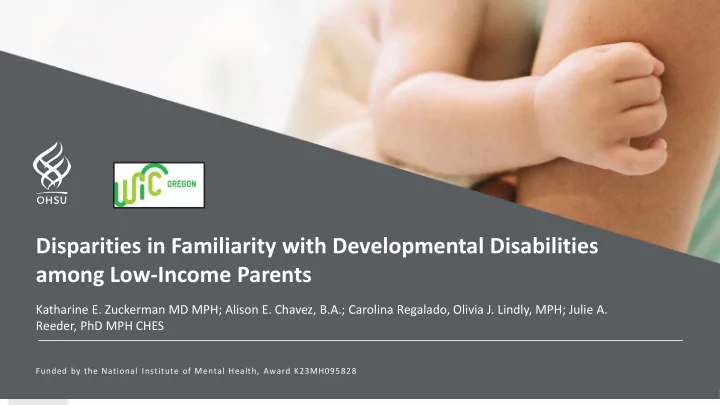

Disparities in Familiarity with Developmental Disabilities among Low-Income Parents Katharine E. Zuckerman MD MPH; Alison E. Chavez, B.A.; Carolina Regalado, Olivia J. Lindly, MPH; Julie A. Reeder, PhD MPH CHES Funded by the National Institute of Mental Health, Award K23MH095828
Background • Developmental disabilities (DDs) affect 1 in 6 children in U.S. • Early diagnosis and treatment: • Improved developmental outcomes • Improved family coping with condition • Possible cost savings • Low-income and minority children at risk for under-identification and treatment of DDs. • These children less likely to participate in Part C Early Intervention and other early childhood services. 2
Background: This project • Differences in parents’ awareness of DDs and their early signs may contribute to disparities in DD identification . APPROACH: RESEARCH GAP: Community samples of low- Little is known about low income parents income and minority parent information about and experience with DDs in early childhood Insight into what parents of children with DDs understand in early childhood, prior to diagnosis
Study setting: Oregon WIC Program (Special Supplemental Nutrition Program for Women, Infants and Children) WIC serves : WIC provides: • Pregnant women and children • Nutrition and health age 0-5 screening • Families with incomes <185% • Nutrition education and Federal Poverty Level (75% below 100% FPL) breastfeeding support • Nationally • Supplemental foods • 42% Latino, • Referrals • 20% African American • Appts with families 4 • 4% Asian/PI • 5% Native American times/year
Research Questions 1. How knowledgeable are WIC participants and WIC staff about signs of a potential development delay? 2. Does parent knowledge differ by race/ethnicity or English proficiency? 3. What role do WIC staff play in making critical developmental observations and connecting parents to community services? 5
Survey Administration – Parent Survey • Face-to-face (waiting room intercept) parent survey at 7 of Oregon’s 34 WIC agencies. – Selected agencies with larger percentages of Latino participants. • Self-administered survey • Oral administration available in English or Spanish • 79% of parents approached completed the survey (n = 539). 6
Survey Administration – Staff Survey Online survey of Oregon WIC clinical staff • Staff survey assessed: – Knowledge of child development – Frequency of parent asking about concerns and staff noticing concerns – Staffs’ perceived connectedness with Early Intervention and pediatric medical providers
Knowledge of Early Signs 8
Knowledge about Developmental Disabilities 9
Final Sample Parent Survey Staff Survey • 539 parents at 10 WIC • 153 clinical staff (80% of clinic sites (7 LA’s) all eligible staff) – 30.0% non-Latino white – Represented 33 of 34 (NLW) agencies – 10.7% non-Latino other – Mean yrs in WIC: 12.5 race (NLO) – 72.5% worked at WIC for – 19.4% Latino, English >5 years proficient (L-EP) – 88% White, 24% Latino – 37.0% Latino, limited English proficient (L- – 39% bilingual LEP)
Results – WIC staff have good knowledge of child development – If staff observe a concern, likely warrants follow-up Staff scores not Mean staff score: significantly 82% correct different by staff position
Average parent score on child development questions by parent ethnicity, race, and English proficiency 100% Mean parent score: 68% correct Average Correct Score 74.8% 80% 67.1% 66.1% 59.7% 60% 40% 20% 0% Non-Latino, white Latino, English Latino, limited Non-Latino, other (NLW) proficient (L-EP) English proficient race (NLO) * (L-LEP) * Demographic Characteristics of Parent * Indicates p<0.01 compared to NLW participants.
Self-reported knowledge about DDs “How much do you know about these conditions?” 13
Community Contacts with DDs “Do you have a family member or friend with…..” 70% 64% 60% 50% * * 44% 44% 40% 40% 40% 30% 30% 26% 22% * 20% 16% 13% * * 10% 6% 4% 0% ASD ADHD Intellectual Disability White Other Latino-EP Latino-LEP *p <0.05 compared to non-Latino White, on bivariate and multivariable analyses
How frequently do WIC staff field parent developmental questions or notice concerning behaviors in a child? Parents asked staff about concerns (n = 153) Staff noticed concerns (n = 153) 39.5% More than once per week 27.6% 38.8% Between once per week and once per month 54.0% 18.4% Less than once per month 17.1% 3.3% Never 1.3% -20% 0% 20% 40% 60% 80% 100% Percentage of Respondents
• Have you ever shared a concern about your child’s development with WIC staff? Of those who responded “yes,” NLO and L-LEP families were more likely to share concerns with WIC staff than NLW or L- EP families 35.4% of 67.6% of families families Concerns were developmental, behavioral, nutritional, and health-related. “[Staff] gave great pointers and advice.” “Confirmed helpful people to talk to.”
WIC Staff Do Not Feel Well Connected to Providers Early Intervention Pediatric medical providers 69.3% < well 74.3% < well connected connected
Conclusions & Implications • Low-income families have unmet needs when it comes to child development information • Low-income families, particularly Spanish speaking families want to talk about developmental concerns • Spanish speaking families maybe less personally familiar with common developmental conditions
Conclusions & Implications • Observation/discussion of potential developmental delays occurs frequently in WIC • WIC staff do not feel well connected to providers who could further assess concerns • There is little or no communication back to staff from pediatricians or E.I. about referrals they make • There is a lack of continuity of care for families • Early Intervention, Pediatricians, and Managed Care Organizations may want to partner with WIC to engage their shared patient population and decrease disparities in assessment and treatment
Thank you! Contact: julie.a.reeder@dhsoha.state.or.us zuckerma@ohsu.edu
Recommend
More recommend